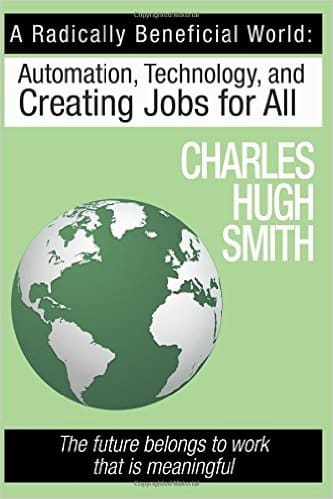For those of you who have already picked up a copy of my latest book, The Chaos Protocols, you’ll no doubt have detected Charles’s influence in a few of the chapters. He’s among the cleverest independent financial minds out there today.
We don’t just talk the Benjamins, however. We also talk gardening, nutrition, philosophy, what to study at college, digital currencies, how talking about money is really talking about meaning, and the return of the real.
Download the episode here or listen along on YouTube below. Enjoy!
Show Notes
- Charles’s excellent blog. You should subscribe.
- Charles’s latest book: A Radically Beneficial World: Automation, Technology and Creating Jobs for All: The Future Belongs to Work That Is Meaningful
3) Charles’s previous book, also excellent, particularly if you are in or contemplating college: Get a Job, Build a Real Career and Defy a Bewildering Economy








I love how many of my favorites turn up in your work – Charles here, the Joe Bageant quote in The Chaos Protocols…
I stumbled upon your work in googling “whiskey sit down” about a year and a half ago and have enjoyed most every post of your blog since. I can tell you read a fair amount of zerohedge as do I and Charles plays such an important balancing role there (christ it seems the editors are leaning Trump!) This particular podcast comes at a time where I am trying to put together a string of related entities in Vermont that all directly emphasize decentralization and retooling ourselves and our communities to try and build something real and lasting for our children and theirs… In googling Whiskey sit down I was trying to see if anyone else was hosting sporadic meetings of strangers to share an over supply of holiday scotch and talk radical community politics. I think quite honestly there will soon be a time where America will need a “Decentralization Party” or Decent Political Party (I stake claim to that by the way, though feel free to share!) and I have been trying to Work out the kinks of a community economic concept that is focused on bettering communities by establishing, in tandem, a community commons foundation and a community commons corporation where the foundation side not only helps to harness the charity and goodwill of a community, it also opens up a channel for the older generation to share a slice of their achievements . It allows a sense of being part of building a legacy of commonwealth within your community. Plus the foundation side can help pitch in on the corporation side through grants and administrative and legal assistance. The commons corporation could take the approach of a B corp where its social benefits standards are clearly stated. Ultimately what any particular community commons corp becomes is up to those who actually put skin in the game and make things happen but I personally imagine that taking a multi-tiered approach to engage as many parts of a particular community as possible would result in the greatest public benefit. Essentially you could either get a few folks to pitch in on community solar or a community garden or you could assemble a muti-faceted “Mondragon” style corporate conglomerate. I think most communities could ultimately come together to create something better in between… I think I’m about your ageish and I live in Vermont with my wife and three kids, two dogs and four cats on a tiny slice of river valley that I have signed my life over to and I think there are honestly people who are ready to consider taking a little slice of their retirement funds out of wall street and putting it right into the betterment of their own community. In fact I had a strange and magically uplifting thought the other day… What if a decentralization movement were to start that had a vehicle like a community foundation/corporation to express itself and people began to publicly pledge that on such and such a day they were planning on putting X amount of dollars into their community? Imagine if you could build a Bernie-like grassroots movement doing something like that… There is change you can believe in! As I listened to you and Charles bring up your great and important points it was really reassuring to hear that there are people who are beginning to introduce these “decentralized life” thoughts from many backgrounds and what I admire about you most Gordon is your absolute mastery of tying the pieces together. I would love to hear your thoughts if you have a few seconds in you already too busy life.
I enjoyed this so much more than I thought I would. Thank you!
This was an excellent interview – I have been aware of Charles Hugh Smith for a while but I have never heard his ideas explained so clearly as they are here. This interview is an excellent example of what elevates this site above others in that you take pains to place magical thought within its wider context in society and the economy. If people don’t think a discussion of money belongs on a magical blog/podcast then they have no idea of how useful (and widespread) occult ideas are at the top levels.
I did have a couple of quibbles that I would be very interested to hear your thoughts on:
1. “Consolidation has run its course”
As someone whose business is buying and consolidating other businesses I can categorically say that there are more opportunities than I will ever be able to take advantage of no matter how long I live. The example that Smith uses of the oil industry is a good example of a very mature business where there isn’t much in the way of consolidation that can happen, but it is fallacious to extrapolate that across the whole economic sphere as there are many other markets/industries where it can – and that is just in N.America or Europe, things are even more interesting in Asia (never mind Africa/S.America).
2. “Digital currency collapses”
I think you are absolutely correct that we are heading for digital currencies but I am curious as to why you think it will (1) collapse and (2) why Smith thinks that will be in 10-15 years? If anything, once we get to a globally accepted digital currency you are all probably in for a very long, slow grind downwards as global living standards get leveled out. I must confess that I haven’t read his latest book (and yours is still on order from Amazon UK) so the answers could be in there. This was something you touched on in the interview but didn’t explore and I think is is essential because, while I find his ideas interesting and even compelling in the abstract, I think there is too much wishful thinking in his analysis.
Having said all of that, a localised labour-backed currency of the kind that Smith advocates is a much better solve for long-term structural unemployment caused by revolutionary technological change than a universal basic income – it may in fact be the only credible solve. That is the only path that I can see leads us to something like Smith is describing, we end up with two levels of economic activity: (1) national/international using a govt digital currency upon which taxes are payable to central govt and (2) local using a local currency on which no central govt taxes are payable. No-one receives any benefits but no-one has to work in the digital currency economy if they don’t want to/don’t have to.
Regardless, it was a thought-provoking podcast as ever, and even though it was probably well outside of the comfort zone of most of your audience, you are doing them a service by exposing them to this sort of material.
I really, really enjoyed this podcast. And I always thought I hated economics. Charles was fantastic at explaining terms and concepts so that anyone could understand, at least on a basic level, what the conversation was about. The end message was unexpected and so appreciated. Security in what’s meaningful. So, I like economics more than I thought. Good lesson for the day.